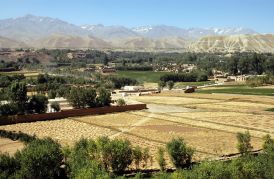
By Nangyalai Attal
As one of the top growth sectors in Afghanistan, agriculture is the backbone of the economy—and women and girls are the backbone of agriculture, with 70 percent of rural women working directly or indirectly in the sector (AREU 2017). Even though girls learn agricultural skills informally from family and friends, they make up only 12 percent of all students in agricultural Technical and Vocational Education and Training (TVET). Afghan girls are trapped in a vicious cycle that limits their potential to develop their skills and use them effectively for national growth and self-reliance.
This brief offers context for understanding the barriers to girls’ participation in agricultural TVET. A particularly formidable challenge, for example, is that parents, teachers, and even students themselves consider agricultural education to be second-class. Moreover, policies and practices within the Afghan education system present girls with numerous impediments to perceiving agricultural education as a viable path to a successful career.
Watch 2021 Echidna Global Scholar Nangyalai Attal discuss his research focused on how to increase girls’ access to formal agricultural education in Afghanistan.
The brief offers recommendations for ways national and international actors can cultivate awareness among students, teachers, parents, and their communities that agriculture can be a first-class educational opportunity. It also identifies ways to remove systemwide barriers, such as by improving the quality of agricultural TVET, recruiting more female teachers who can serve as role models, and creating pathways to higher degrees within TVET. Lastly, it proposes avenues through which formal agricultural TVET can map routes to successful careers for young women in the formal labor market.
The future of girls’ education—and of TVET itself—has become highly uncertain since the Taliban assumed power in August 2021. While this dramatic event was beyond the scope of this study, this brief makes a call to action that, in the immediate term, we ensure that all girls can return to school—particularly to build their literacy skills to take advantage of formal technical and vocational trainings—and that they continue to receive nourishment during a national food shortage. In the longer term, my research seeks to help girls and young women in Afghanistan realize their full potential to contribute to the national economy and food production system, and provide guidance for national and international organizations seeking to support girls’ participation in agricultural TVET.
Download the full policy brief»









